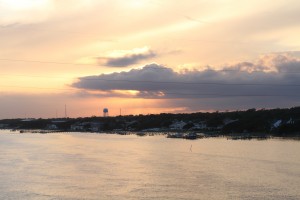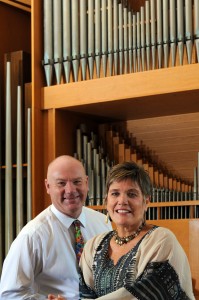
Carolina launched a new, two-year academic theme focused on water, which kicked off this fall. (photo by Mary Lide Parker)
For more stories about water initiatives in the College, click on the links at the bottom of this story.
Water. Life depends on it, and this fall the Carolina campus is becoming immersed in it.
On World Water Day last spring, UNC announced that water would be the focus of a two-year, campus-wide academic theme called “Water in Our World.” It’s the first time the University has adopted a theme meant to saturate every corner of campus: from professors’ research agendas to classroom curricula to student activities.
The water initiative is being led by Terry Rhodes, former chair of the department of music and the new senior associate dean for fine arts and humanities in the College of Arts and Sciences, and Jamie Bartram, a distinguished professor and director of the UNC Water Institute in the Gillings School of Global Public Health. (Bartram is the keynote speaker for University Day.) Rhodes says that the theme will bridge the humanities and the sciences, and it seeks to make interdisciplinary connections among researchers on campus who work on water issues but may be unaware of each other.
While the theme will encompass technical issues about water such as water purity and supply, the University will also host “a water and health conference, dramatic performances, film screenings, directed book readings, visiting scholars, symposia, special academic courses, writing and photography competitions all tied to water,” according to Rhodes.
Bartram, who was one of the originators of the water initiative, says, “It was one of the very few topics that was relevant to every part of campus.”
Within the College, new courses are being developed in anthropology, African and Afro-American studies, Asian studies, geological sciences and history. Five professors in the College have received grants from the Center for Global Initiatives to support the development of new courses and curricula based on water
Outside the classroom, events and lectures are being planned as well as artistic ventures. Lee Weisert, an assistant professor in the department of music, previously designed two sound installations which explored the aesthetic qualities of water, and he plans to showcase those again as part of the new water theme.
The first installation, called the “Argus Project” will be presented at a nearby pond encircled by speakers. The second sound installation, titled “Cryoacoustic Orb,” will take place in a campus gallery space where large spheres of ice will have embedded microphones to amplify the sound of melting as the spheres are warmed by heat lamps.
 “Both of the projects focus attention on the natural characteristics of aquatic environments and processes, with technology primarily functioning as a way of accessing and magnifying them,” Weisert says.
“Both of the projects focus attention on the natural characteristics of aquatic environments and processes, with technology primarily functioning as a way of accessing and magnifying them,” Weisert says.
Bartram also hopes the University will create a mobile Web application that will allow students to calculate their “water footprint,” or how much water they use on campus.
“It’s a real opportunity to see how our individual day-to-day lives affect a major natural resource,” Bartram says. Other campus discussions may include the effect of hydraulic fracturing (fracking) on local water sources, an issue the state of North Carolina has grappled with; water conservation; and connections between water, public health and poverty.
One goal of the campuswide theme is to address problems that are both global and local, such as water scarcity, potability and pollution. This fall, UNC will host the 2012 Water and Health Conference: Science, Policy and Innovation from Oct. 29 to Nov. 2. For information, visit http://whconference.unc.edu.
UNC is the only academic institution to be one of five founding partners in the U.S. Water Partnership. The partnership is a countrywide initiative which brings together the best of the U.S.— through NGOs, academia or the private sector — to confront and respond to big water challenges, primarily in developing countries.
Rhodes and Bartram are eager to hear your ideas about the water theme. Email them to watertheme@unc.edu. For more, visit watertheme.unc.edu.
[ By DeLene Beeland, fall 2012 Carolina Arts & Sciences magazine ]

